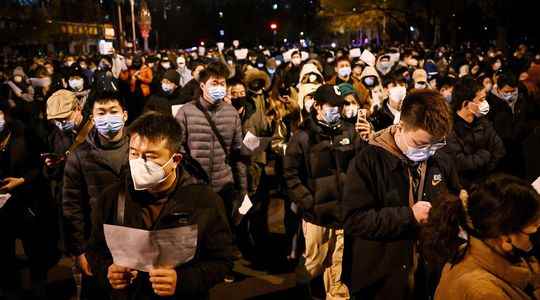A step towards liberation? After a wave of unprecedented protests in the country last week, the Chinese authorities are giving hope for a possible easing of the drastic “zero Covid” policy, concerning tests and confinement which has paralyzed the country and confined the population for three year. China “faces new circumstances”, thanks to the less dangerous nature of the Omicron variant and the advancement of vaccination, said Deputy Prime Minister Sun Chunlan this Wednesday, November 30, before the National Health Commission (NHC). However, she made no direct mention of a relaxation of the “zero Covid” policy. Is this really a sign of an evolution in Chinese health policy?
The sinologist historian and adviser for Asia at the Institut Montaigne François Godement provides elements of analysis.
The statements made by Beijing are vague. Can we really believe in the sign of a reduction in health policy?
François Godement: In reality, the first signs of relaxation came just after the Congress of the Chinese Communist Party in October. At its end, 20 directives were published by the Council of State Affairs, which already express a desire for relief on several overly strict points of confinement.
However, it remains confusing and paradoxical. On the one hand, these directives establish that local administrations apply the rules too strictly. On the other, they reaffirm that we must fight resolutely against the evolution of Covid-19. As China is currently in the midst of an explosion of contamination, it is very likely that local administrations will not know how to interpret these instructions. Beijing has nevertheless announced the acceleration of the vaccination of vulnerable people, which goes in the direction of an easing of containment measures.
What role did the protests that rocked the country last week play?
FG: The demonstrations have finished putting the Chinese government on the back foot, and are forcing it to further monitor the application of anti-Covid measures in the territory. Because in some more civilized and developed regions, negotiations and adaptations to everyday life have been more possible for a while. But in other areas, state orders have led to extreme applications, such as welding building doors to lock people into their homes, erecting physical barriers in certain neighborhoods, neglecting the food supply of the people locked up… After three years, it’s no longer working.
What weighed was the simultaneity of the demonstrations, which occurred at the same time in several cities, universities, and key companies such as the iPhone Foxconn factory, in which 200,000 employees found themselves locked up when a cluster exploded. All this was organized thanks to social networks, to encrypted messages in particular. We see that the state’s control over social networks has crumbled a little: some outbursts escape them and create bushfires, which are quickly extinguished thereafter. But the system still prevents any larger convergence, which could create a real national protest.
What options does China have to break the deadlock over its policy of not spreading the virus?
FG: There is no “good” way out of this “zero Covid” policy. We can take the example of Taiwan, which in 2020 and 2021 was praised as having one of the most effective prevention policies in the world. The latter prevented the Covid from spreading on its territory thanks to prevention, detection, and isolation at home. As soon as these restrictive measures were relaxed, the number of cases ignited, because many inhabitants had never been contaminated. Currently, Taiwan has 30% more Covid deaths than France, for the same population.
One of China’s problems is also the refusal to use Western vaccines, which are much more effective than Chinese vaccines. The hope was to succeed in developing a chain of Chinese messenger RNA vaccines, as effective as Moderna or Pfizer. It did not work. Beijing ended up buying the Pfizer license, but refuses for the moment to use it. Without a Western vaccine, it will be difficult for China to emerge from the lockdowns.
Beijing therefore has two solutions. Betting on vaccination and maintaining strict confinements (at home rather than in a detention center for example) until the population is better protected. Or else relax the confinements, but accept very high mortality and an overflow of hospitals, which are on average four times less well equipped than French hospitals, with respirators in intensive care units in particular. In both cases, the road will be very long before the return to a normal life for the Chinese.
